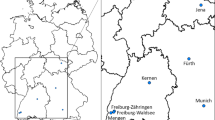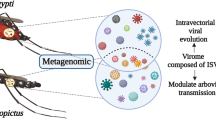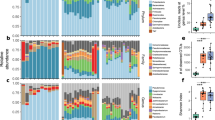Abstract
Dengue is the widest spread vector-borne viral disease around the world and is transmitted mainly by the urban mosquito, Aedes aegypti. At present, vector control is the most widely used strategy to decrease disease incidence. However, it has demonstrated limited success. A new control strategy, associated with the manipulation of vector competence (VC) using endosymbiotic microorganisms, may be more sustainable because these microorganisms can influence mosquito development, the vector immune response, and vectorial capacity for infection with dengue virus (DENV). Hence, we explored the diversity of culturable midgut microbiota from two field-derived Aedes aegypti strains that are either susceptible or refractory to DENV infection and evaluated how strain-level dissection of the gut microbiome modulates VC. Microbial identification was carried out by mass spectrometry using MALDI-TOF, Vitek-2, BD Phoenix, and 16 s rRNA sequencing. There were differences in the composition and density of midgut microbiota in both mosquito strains. The refractory strain showed the highest microbial diversity and density with the highest prevalence of Gram-negative bacteria including Pseudomonas, Serratia, Stenotrophomonas, and Escherichia genera. In the susceptible strain, only Gram-positive bacteria of the Bacillus genus and Candida yeast were observed in the midgut. To evaluate the effect of midgut microbiota on DENV-2 infectivity in both Aedes aegypti strains, mosquitoes were treated with sugar and an antibiotic/antimycotic cocktail or sugar alone (the control) and were subsequently challenged with a mixture of blood and DENV-2. DENV-2 infection in the mosquitos’ heads (salivary glands) and midguts was evaluated after an extrinsic period of fourteen days with indirect immunofluorescence. A significant increase in DENV-2 susceptibility was observed in the treated refractory strain from 51.22% to 86.64% (Chi-square = 9.747, p < 0.05), while no changes were observed in the susceptible strain. These results confirm that susceptible and refractory mosquito strains may influence or are influenced by the presence of different gut microorganisms that affect virus infection susceptibility.


Similar content being viewed by others
Change history
18 November 2019
In the article Culturable microbial composition in the midgut of <Emphasis Type="Italic">Aedes aegypti</Emphasis> strains with different susceptibility to dengue-2 virus infection.
References
Andrade BB, Teixeira CR, Barral A, Barral-Netto M (2005) Haematophagous arthropod saliva and host defense system: a tale of tear and blood. An Acad Bras Cienc 77(4):665–693 https://doi.org/10.1590/S0001-37652005000400008
Apte-Deshpande A, Paingankar M, Gokhale MD, Deobagkar DN (2012) Serratia odorifera a midgut inhabitant of Aedes aegypti mosquito enhances its susceptibility to dengue-2 virus. PLoS One 7:e40401. https://doi.org/10.1371/journal.pone.0040401
Bhatt S, Gething PW, Brady OJ, Messina JP, Farlow AW, Moyes CL, Drake JM, Brownstein JS, Hoen AG, Sankoh O, Myers MF, George DB, Jaenisch T, Wint GRW, Simmons CP, Scott TW, Farrar JJ, Hay SI (2013) The global distribution and burden of dengue. Nature 496(7446):504–507. https://doi.org/10.1038/nature12060
Brady OJ, Gething PW, Bhatt S, Messina JP, Brownstein JS, Hoen AG, Moyes CL, Farlow AW, Scott TW, Hay SI (2012) Refining the global spatial limits of dengue virus transmission by evidence-based consensus. PLoS Negl Trop Dis 6(8):e1760. https://doi.org/10.1371/journal.pntd.0001760
Caicedo PA, Baron OL, Pérez M, Alexander N, Lowenberger C, Ocampo CB (2013) Selection of Aedes aegypti (Diptera: Culicidae) strains that are susceptible or refractory to Dengue-2 virus. Can Entomol 145(3):273–282. https://doi.org/10.4039/tce.2012.105
Caicedo PA, Serrato IM, Sim S, Dimopoulos G, Coatsworth H, Lowenberger C, Ocampo CB (2018) Immune response-related genes associated to blocking midgut dengue virus infection in Aedes aegypti strains that differ in susceptibility. Insect Sci 26(4):635–648. https://doi.org/10.1111/1744-7917.12573
Charan SS, Pawar KD, Severson DW, Patole MS, Shouche YS (2013) Comparative analysis of midgut bacterial communities of Aedes aegypti mosquito strains varying in vector competence to dengue virus. J Parasitol Res 112:2627–2637. https://doi.org/10.1007/s00436-013-3428-x
Cirimotich CM, Dong Y, Clayton AM, Sandiford SL, Souza-Neto JA, Mulenga M, Dimopoulos G (2011) Natural microbe-mediated refractoriness to Plasmodium infection in Anopheles gambiae. Science 13:855–858. https://doi.org/10.1126/science.1201618
Coon KL, Valzania L, McKinney DA, Vogel KJ, Brown MR, Strand MR (2017) Bacteria-mediated hypoxia functions as a signal for mosquito development. Proc Natl Acad Sci 114(27):E5362–E5369. https://doi.org/10.1073/pnas.1702983114
Coutinho-Abreu IV, Zhu KY, Ramalho-Ortigao M (2010) Transgenesis and paratransgenesis to control insect-borne diseases: current status and future challenges. Parasitol Int 59:1–8. https://doi.org/10.1016/j.parint.2009.10.002
Dong Y, Manfredini F, Dimopoulos G (2009) Implication of the mosquito midgut microbiota in the defense against malaria parasites. PLoS Pathog 5:e1000423. https://doi.org/10.1371/journal.ppat.1000423
Fouda MA, Hassan MI, Al-Daly AG, Hammad KM (2001) Effect of midgut bacteria of Culex pipiens L. on digestion and reproduction. J Egypt Soc Parasitol 31:767–780
Gaio A de O, Gusmão DS, Santos AV, Berbert-Molina MA, Pimenta PFP, Lemos FJA (2011) Contribution of midgut bacteria to blood digestion and egg production in Aedes aegypti (diptera: culicidae) (L.). Parasit Vectors 4(1):1–10. https://doi.org/10.1186/1756-3305-4-105
González-Cerón L, Santillan F, Rodríguez MH, Méndez D, Hernández-Ávila JE (2003) Bacteria in midguts of field-collected Anopheles albimanus block Plasmodium vivax sporogonic development. J Med Entomol 40:371–374. https://doi.org/10.1603/0022-2585-40.3.371
Gusmão DS, Santos AV, Marini DC, Bacci M Jr, Berbert-Molina MA, Lemos FJA (2010) Culture-dependent and culture-independent characterization of microorganisms associated with Aedes aegypti (Diptera: Culicidae) (L.) and dynamics of bacterial colonization in the midgut. Acta Trop 115(3):275–281. https://doi.org/10.1016/j.actatropica.2010.04.011
Hammer Ø, Harper DAT, Ryan PD (2001) PAST: paleontological statistics software package for education and data analysis ver 1.89. Palaeontol Electron 4(1):1–9.
Higgs S, Traul D, Davis BS, Kamrud KI, Wilcox CL, Beaty BJ (1996) Green fluorescent protein expressed in living mosquitoes without the requirement of transformation. Biotechniques 21(4):660–664. https://doi.org/10.2144/96214st03
Hill CL, Sharma A, Shouche Y, Severson DW (2014) Dynamics of midgut microflora and dengue virus impact on life history traits in Aedes aegypti. Acta Trop 140:151–157. https://doi.org/10.1016/j.actatropica.2014.07.015
Jupatanakul N, Sim S, Dimopoulos G (2014) The insect microbiome modulates vector competence for arboviruses. Viruses 6:4294–4313. https://doi.org/10.3390/v6114294
Kathuria S, Singh PK, Sharma C, Prakash A, Masih A, Kumar A, Meis JF, Chowdhary A (2015) Multidrug-resistant Candida auris misidentified as Candida haemulonii: characterization by matrix-assisted laser desorption ionization–time of flight mass spectrometry and DNA sequencing and its antifungal susceptibility profile variability by Vitek 2, CLSI broth microdilution, and Etest method. J Clin Microbiol 53:1823–1830. https://doi.org/10.1128/JCM.00367-15
Marucco AP, Minervini P, Snitman GV, Sorge A, Guelfand LI, Moral LL (2018) Comparison of the identification results of Candida species obtained by BD Phoenix™ and Maldi-TOF (Bruker microflex LT Biotyper 3.1). Rev Argent Microbiol 50(4):337–340. https://doi.org/10.1016/j.ram.2017.10.003
Minard G, Tran FH, Raharimalala FN, Hellard E, Ravelonandro P, Mavingui P, Valiente Moro C (2013) Prevalence, genomic and metabolic profiles of Acinetobacter and Asaia associated with field-caught Aedes albopictus from Madagascar. FEMS Microbiol Ecol 83(1):63–73. https://doi.org/10.1111/j.1574-6941.2012.01455.x
Moll RM, Romoser WS, Modrakowski MC, Moncayo AC, Lerdthusnee K (2001) Meconial Peritrophic membranes and the fate of midgut Bacteria during mosquito (Diptera : Culicidae) metamorphosis. J Med Entomol 38(1):29–32. https://doi.org/10.1603/0022-2585-38.1.29
Nene V, Wortman JR, Lawson D, Haas B, Kodira C, Tu ZJ, Loftus B, Xi Z, Megy K, Grabherr M, Ren Q, Zdobnov EM, Lobo NF, Campbell KS, Brown SE, Bonaldo MF, Zhu J, Sinkins SP, Hogenkamp DG, Amedeo P, Arensburger P, Atkinson PW, Bidwell S, Biedler J, Birney E, Bruggner RV, Costas J, Coy MR, Crabtree J, Crawford M, deBruyn B, DeCaprio D, Eiglmeier K, Eisenstadt E, el-Dorry H, Gelbart WM, Gomes SL, Hammond M, Hannick LI, Hogan JR, Holmes MH, Jaffe D, Johnston JS, Kennedy RC, Koo H, Kravitz S, Kriventseva EV, Kulp D, LaButti K, Lee E, Li S, Lovin DD, Mao C, Mauceli E, Menck CFM, Miller JR, Montgomery P, Mori A, Nascimento AL, Naveira HF, Nusbaum C, O'Leary S, Orvis J, Pertea M, Quesneville H, Reidenbach KR, Rogers YH, Roth CW, Schneider JR, Schatz M, Shumway M, Stanke M, Stinson EO, Tubio JMC, VanZee JP, Verjovski-Almeida S, Werner D, White O, Wyder S, Zeng Q, Zhao Q, Zhao Y, Hill CA, Raikhel AS, Soares MB, Knudson DL, Lee NH, Galagan J, Salzberg SL, Paulsen IT, Dimopoulos G, Collins FH, Birren B, Fraser-Liggett CM, Severson DW (2007) Genome sequence of Aedes aegypti, a major arbovirus vector. Science 27:1718–1723. https://doi.org/10.1126/science.1138878
Ocampo CB, Caicedo PA, Jaramillo G, Bedoya RU, Baron O, Serrato IM, Cooper DM, Lowenberger C, Jan E, (2013) Differential expression of apoptosis related genes in selected strains of aedes aegypti with different susceptibilities to dengue virus. PLoS ONE 8(4):e61187
Packierisamy PR, Ng CW, Dahlui M, Inbaraj J, Balan VK, Halasa YA, Shepard DS (2015) Cost of dengue vector control activities in Malaysia. Am J Trop Med Hyg 93(5):1020–1027. https://doi.org/10.4269/ajtmh.14-0667
Pidiyar V, Kaznowski A, Narayan NB, Patole M, Shouche YS (2002) Aeromonas culicicola sp. nov., from the midgut of Culex quinquefasciatus. Int J Syst Evol Microbiol 52:1723–1728. https://doi.org/10.1099/00207713-52-5-1723
Pincus DH (2006) Microbial identification using the bioMérieux Vitek® 2 system. In: Encyclopedia of rapid microbiological methods, Bethesda, MD
Ramirez JL, Souza-Neto J, Torres Cosme R, Rovira J, Ortiz A, Pascale JM, Dimopoulos G (2012) Reciprocal tripartite interactions between the Aedes aegypti midgut microbiota, innate immune system and dengue virus influences vector competence. PLoS Negl Trop Dis 6:e1561. https://doi.org/10.1371/journal.pntd.0001561
Ricci I, Damiani C, Capone A, DeFreece C, Rossi P, Favia G (2012) Mosquito/microbiota interactions: from complex relationships to biotechnological perspectives. Curr Opin Microbiol 15(3):278–284. https://doi.org/10.1016/j.mib.2012.03.004
Rodrigues J, Brayner FA, Alves LC, Dixit R, Barillas-Mury C (2011) Hemocyte differentiation mediates innate immune memory in Anopheles gambiae mosquitoes. Science 329:1353–1355. https://doi.org/10.1126/science.1190689
Serrato IM, Caicedo PA, Orobio Y, Lowenberger C, Ocampo CB (2017) Vector competence and innate immune responses to dengue virus infection in selected laboratory and field-collected Stegomyia aegypti (= Aedes aegypti). Med Vet Entomol 31(3):312–319. https://doi.org/10.1111/mve.12237
Shepard DS, Undurraga EA, Halasa YA (2013) Economic and disease burden of dengue in Southeast Asia. PLoS Negl Trop Dis 7(2):e2055. https://doi.org/10.1371/journal.pntd.0002055
Simmons CP, Farrar JJ, Nguyen VVC, Wills B (2012) Dengue. N Engl J Med 366(15):1423–1432. https://doi.org/10.1056/NEJMra1110265
Touré AM, Mackey AJ, Wang ZX, Beier JC (2000) Bactericidal effects of sugar-fed antibiotics on resident midgut bacteria of newly emerged anopheline mosquitoes (Diptera: Culicidae). J Med Entomol 37:246–249. https://doi.org/10.1093/jmedent/37.2.246
Wu P, Sun P, Nie K, Zhu Y, Shi M, Xiao C, Liu H, Liu Q, Zhao T, Chen X, Zhou H (2019) A gut commensal bacterium promotes mosquito permissiveness to arboviruses. Cell Host Microbe 25(1):101–112. https://doi.org/10.1016/j.chom.2018.11.004
Ye YH, Ng TS, Frentiu FD, Walker T, Van den Hurk A, O’Neill S, Beebe NW, McGraw EA (2014) Comparative susceptibility of mosquito populations in North Queensland, Australia to oral infection with dengue virus. Am J Trop Med Hyg 90(3):422–430. https://doi.org/10.4269/ajtmh.13-0186
Acknowledgements
This research was funded in part by COLCIENCIAS grant (Contract 2229-569-33469 to Clara Ocampo) and Innovative Young Researcher award (0234-2014). We want to thank Luis Ernesto Ramírez for technical support, to Rebeca Byler and Douglas Farnes for English edition, the Bacterial Resistance Unit of CIDEIM, Imbanaco Clinic Medical Center, and Children’s Club Noel Foundation for the support given.
Author information
Authors and Affiliations
Corresponding authors
Ethics declarations
Conflict of interest
The authors declare that they have no conflict of interest.
Ethical approval
Experimental protocols and the use of hamsters and rabbit blood to feed and maintain insect colonies at CIDEIM were approved by the CIDEIM Institutional Review Committee for Research in Animals (#1021) (Comité de Ética para la Investigación en Animales Experimentales- CEIA). The CEIA is governed by law 84 of 1989 and resolution 8430 of 1993 of the National Ministry of Agriculture of Colombia in which scientific, technical and administrative standards are established for animal research.
Additional information
Publisher’s note
Springer Nature remains neutral with regard to jurisdictional claims in published maps and institutional affiliations.
Rights and permissions
About this article
Cite this article
Molina-Henao, E.H., Graffe, M.Y., De La Cadena, E.P. et al. Culturable microbial composition in the midgut of Aedes aegypti strains with different susceptibility to dengue-2 virus infection. Symbiosis 80, 85–93 (2020). https://doi.org/10.1007/s13199-019-00646-y
Received:
Accepted:
Published:
Issue Date:
DOI: https://doi.org/10.1007/s13199-019-00646-y




